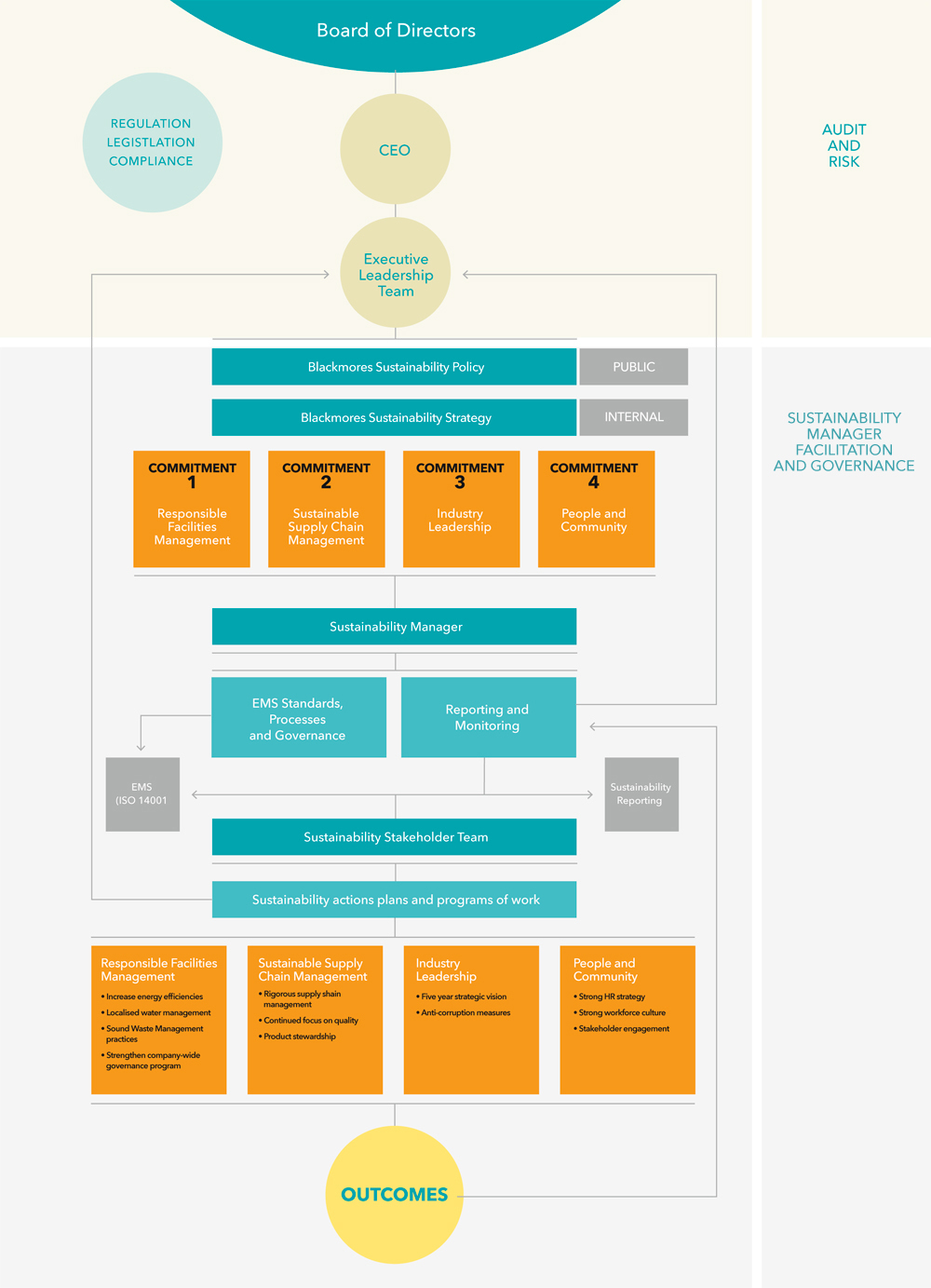Blackmores’ Inaugural Sustainability Report
Blackmores’ inaugural Sustainability Report details our performance in the financial year ending June 2016 and is prepared under the guidance of the:
- Environmental Social and Governance (ESG) Guidelines for Australian companies.
published by the Australian Council of Superannuation Investors (ASCI) and the Financial Services Council (FSC).
- GRI G4 Sustainability Reporting Guidelines published by the Global Reporting Initiative (GRI).
The Blackmores Sustainability Strategy; governance framework and policy covers all operations in the Blackmores Group, unless stated otherwise.
The scope of the information collated including material issues, boundaries, performance and measures are deemed to reflect those significant economic, environmental, and social impacts identified within the reporting period, based on ongoing feedback we received from internal and external stakeholders.
This report provides the foundation for future reporting.
The sustainability priorities in this report have been identified following extensive consultation to ensure our focus on the matters of greatest importance to our stakeholders and on the measures we can influence.
Our thanks to the team at Deloitte, our audit partners, who have provided independent assurance of the data contained in this report to ensure its accuracy.
Our sustainability focus is placed on finding opportunities for positive change, embracing new ways of doing business whilst continuing to drive sustainable growth, better social outcomes and long-term financial performance.
Further to our vision for healthy people and a healthy planet, we aim to secure and enhance the financial wellbeing of people, businesses and communities.
Blackmores has clear strategic priorities and long-standing values. Our sustainability approach is aligned to these business priorities and values.
The publication of this report marks a significant step towards greater transparency and engagement with our stakeholders on Blackmores’ commitment to sustainable growth.
Our Approach
This report details the most material issues across our four sustainability commitments of:
01
Responsible Facilities
Management
to reduce the environmental intensity and carbon footprint of our facilities and operations.
02
Sustainable Supply Chain
Management
to encourage, support and facilitate an environmentally and socially responsible approach to supply chain management.
03
Industry Leadership
to be a leader in natural health solutions through innovation, research and education.
04
People & Community
to build a supportive workforce, community and marketplace.
Sustainability Governance Framework
We actively consider the environmental, social and economic impacts and influences of our business while seeking ways to use our unique capabilities and resources to make a positive contribution beyond our core products and services
Prioritising Materiality Areas
Materiality refers to how we determine the needs, concerns and expectations raised by both our internal and our external stakeholders and the significance in which each of the aspects influences the success of our business.
In this, our first year of reporting, Blackmores has undertaken a formal materiality assessment process.
Our assessment involved the identification and prioritisation of materiality areas based on our stakeholder concerns and using the guidelines set out in the Global Reporting Initiative (GRI) guidelines as a basis.
Peer Benchmarking
In our initial scope of work we identified the areas of concern through peer benchmarking to gain a greater understanding of how industry peers and best practice organisations within ASX are reporting on sustainability. This work included identifying the frequency of material aspects raised by peers along with how they were presented, measured and reported.
Stakeholder Engagement
A broad range of stakeholders participated in a series of interviews and workshops to identify priority focus areas based on their perception of the topics that impact Blackmores’ potential longevity.
We considered many topics and prioritised these based on:
- Ranking by stakeholders as important
- Alignment with our vision, values, purpose and strategic business priorities
- Potential risk and impact in the business
- Blackmores ability to impact
- Fit with the International guidelines on sustainability – GRI G4.
Fifteen topics identified as priority focus areas for Blackmores

PRIORITY
FOCUS AREAS
01. Responsible Facilities Management
| Why it is important | Strategy | |
|---|---|---|
| Water | Clean, accessible water is essential to life. At Blackmores we recognise the importance of water especially to those who are exposed to inadequate water supply, sanitation and hygiene. The consequences of water scarcity, poor water quality and inadequate sanitation are likely to negatively impact our food and ingredient security. | Our focus on localised management of water, waste water and storm water represent the major elements of our sustainable water program |
| Energy | We accept the Intergovernmental Panel on Climate Change (IPCC) position and the undeniable consequences for our planet. In doing so we acknowledge the responsibility of our organisation to influence climate change through responsible resource management. | Our five-year energy program will focus on implementing strategies to increase energy efficiencies. Adopt green energy solutions across our operations. |
| Effluent & Waste | Sound waste management practices will minimise our environmental footprint. The more we reduce, reuse, recycle and recover the greater the cost savings in materials, energy, transport and disposal. | Continued implementation of sound waste management practices to minimise our environmental footprint. |
| Emissions | We acknowledge our responsibility our organisation has on limiting climate change through responsible resource management. We are committed to implementing strategies to increase resource efficiencies across our operations. | Our aim is to limit our impact on climate change as our business grows. |
| Customer Privacy & Data Protection | As a consumer-centric company we recognise the need to protect data privacy and security of our customers, employees and others. | We will strengthen our company-wide governance program with robust systems, increased staff awareness and training. |
02. Sustainable Supply Chain Management
| Why it is important | Strategy | |
|---|---|---|
| Supply Chain | As we source ingredients from around the world we have an opportunity to work collaboratively with suppliers and positively influence change across many regions. Strategic management of our supply chain and environmental resources have a positive effect on our quality program, helps manage risk and supports our global communities. | Blackmores will continue to work with our partners and suppliers to do ‘more and better with less’ through rigorous supply chain management |
| Product & Service Compliance | Our strong commitment to quality ensures that our products and services consistently meet or exceed the expectations of our customers as well as comply with Australia’s high regulatory standards and requirements. Our rigorous standards guarantee high quality natural healthcare products and services. | Continued maintenance, assessment and improvement of quality standards, across all aspects of the business and the supply chain. |
| Materials | We recognise environmental impacts occur through the whole lifecycle of our products. Resource and supply chain management will reduce these impacts. | A focus on product stewardship to minimise the environmental impacts of our material sourcing and consumption by doing more with fewer resources and less waste. |
03. Industry Leadership
| Why it is important | Strategy | |
|---|---|---|
| Business Performance | We take a leadership position with a reputation for trust and integrity. Focused on our business performance, our sustainability program is integrated into the broader set of business practices. We align the value of sustainability to the long-term outlook of the business. | Deliver on the five-year strategic vision to grow a diverse, responsible and sustainable business. |
| Investment in Research | We are leaders in research, education and development in our industry. We understand the importance of an evidence based approach to natural medicine and the translation of this evidence into practical education, resource and advisory services and materials. | We will continue to invest and strengthen our research, academic and education activities |
| Anti-Corruption | Corrupt work practices and behaviours contravene our corporate values. | We are strengthening our anti-corruption measures and practices to protect our brand reputation and the interests of our stakeholders. |
04. People & Community
| Why it is important | Strategy | |
|---|---|---|
| Our People | Much of our success relies on our ability to attract, develop and retain a high quality, motivated, engaged and diverse workforce. We aim to have the very best talent and provide a flexible, inclusive and supportive workplace culture that enables good decision-making, fosters innovation and productivity. | Strong human resources strategy that is caring and supportive and builds a flexible, inclusive environment. |
| Work Health & Safety | The health and safety of our workforce is a key priority. We want our people to be fit for work and make sure it does not negatively impact their health or wellbeing now or in the future. | We will continue to drive a workforce culture that takes preventative measures towards work related risks and injuries. |
| Communities | In keeping with our corporate values, we recognise the worth of our communities and seek to improve people’s lives through societal participation, education and research. We understand that long-term meaningful relationships create lasting benefits including employment, health and wellbeing. | We will continue to build on our support of local communities and global partnerships help cultivate a culture of health and wellbeing. |
| Stakeholder Engagement | Open dialogue with our stakeholders helps us understand what social, environmental and economic issues matter most to them and our business today and in the future. Stakeholder input helps inform and influence our company’s strategy and operations. | We will continue to engage and respond to our stakeholders about our materiality and our sustainability journey. |
